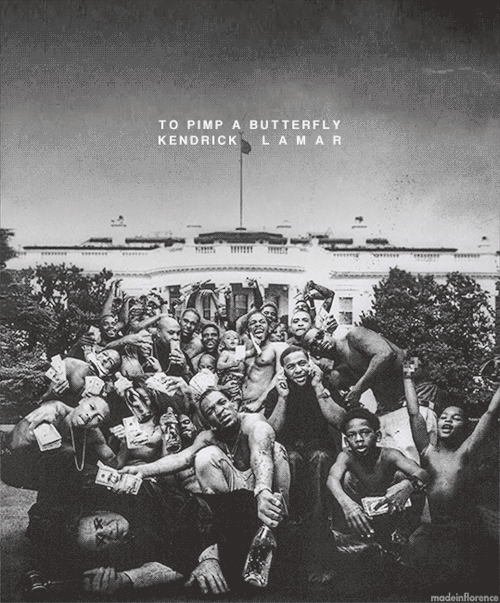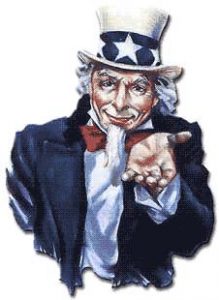Bill Wolff: Hello and welcome back to protest anthems, the podcast about all things music social justice and protest. Today Lauren Bourque dissects and reflects on the song Alright by Kendrick Lamar, off his 2015 album To Pimp a Butterfly. Kendrick Lamar, a rapper from Compton, California has become critically acclaimed and is known as one of the best rappers alive right now. The album’s 4 grammies suggest that Kendrick isn’t just any other rapper, but that his art is powerful and has reached millions. In this episode, Lauren considers the relationship amongst the song, the Black Lives Matter movement and institutional racism. As you’re listening consider if things have gotten alright since its release or if things will ever be alright.
Kendrick Lamar: “Alls my life I has to fight, n-word/ Alls my life I…/ Hard times like, “Yah!” / Bad trips like, “Yah!” Nazareth, I’m fucked up / homie, you fucked up / But if God got us, then we gon’ be alright “

Lauren: Starting off with “Alls my life I has to fight” really brings a sense of pain to the song, but it also has a strong reference. These lines are also found in the 1985 movie, The Color Purple. The movie depicts life during the 1930s for African Americans, but specifically tells these stories through the eyes of women. Played by Oprah Winfrey, the character Sofia says these same lines when talking about all the men who have abused her; physically, mentally, and sexually. In an article written by Greg Tate in Rolling Stone, right after Kendrick’s 2015 BET Award performance, he talks about this idea of SingFight; the notion that singing is a form of fighting. Tate states that, “Black American musical history is chock of full of amazing fight songs, overt and covert, and more than a few steady-aiming, freedom-fighting chanteuses.” We get the sense, from these words, that Lamar has had enough, that he isn’t taking anyone’s shit anymore and instead of laying back and letting things happen to him, he’s going to take a stance to fight against it. In an interview that he had with legendary producer Rick Reuben, Lamar talked about that moment when he knew what he was going to do with the song,
Kendrick Lamar: “…And eventually I came across it. Eventually, I found the right words and what I wanted to talk about. You know, it was a lot going on, and still, to this day, it’s a lot going on. And I wanted to approach it as more uplifting—but aggressive. Not playing the victim, but still having that We strong, you know? And um, that was one record that executed exactly how my approach was in making it”
Lauren: Lamar said he wanted “Alright” to have this sense of “we strong”, that there wasn’t going to be anything that is holding him back from fighting for his rights. This isn’t a new idea, which is why it makes this song so easy to become a protest anthem. In 2015, protesters at Cleveland State University took “Alright” and made the chorus into their own chant.
In the video, we see African American students marching and chanting “We gon’ be alright” as they pass police cars and barricades. Some are holding signs, while others are linked arm and arm. There are thousands of students, mostly students of color, but also students of other races. We can see pain in their faces, some crying and others with chests puffed up ready to protest.
In his music video for “Alright”, Kendrick starts the video off by reciting a poem that he had written and performed throughout his album. Before or at the end of each song, we get a piece of the poem, so by the time the album ends we hear the full thing. At the end of the video he starts reciting the poem.
Kendrick Lamar: “I remember you was conflicted. Misusing your influence sometimes I did the same. Abusing my power full of resentment.
Lauren: The poem goes on for another minute or so, but the important part is at the end
Kendrick Lamar: “As my loved ones was fighting a continuous war in the city, I was fighting a new one. Full of apartheid and discrimination.”
Lauren: Kendrick says, “As my loved ones was fighting a continuous war in the city, I was fighting a new one. Full of apartheid and discrimination.” This part of the poem is up for interpretation because it is so ironic. Kendrick says that he is now fighting a war of racism, since he has moved out of the city of Compton and is now in the music/entertainment industry, an industry full of white executives not giving African Americans the credit they deserve when it comes to their content. So now, he has a whole new battle to go against. He thought that once he made it out of the city, he wouldn’t have any more problems. However, instead of having to face racism and hatred from the police, he now has to face it while he’s making his art and trying to earn a living. Compton has always played a pivotal role in rap with legends such as Snoop Dogg, NWA, and 2pac, who Kendrick has specifically said was an inspiration.

Kendrick Lamar: “what you want you? A house or a car? / Forty acres and a mule? A piano, a guitar? / Anything, see my name is Lucy, I’m your dog / Motherf*cker you can live at the mall”
Lauren: Now, for this part of the song, we need to take a step back and talk about the album. Kendrick is known to have many characters in his album and has based some of them on his own life. So, of typical Kendrick style, he incorporates different characters. One of the characters is Lucy, aka Lucifer, who is also Uncle Sam. I know that sounds confusing, but I will explain. In the opening song of the album, Wesley’s Theory, Kendrick has a very similar verse to the second verse of “Alright” that we just heard. Listen.
Kendrick Lamar: “What you want you? A house or a car? / Forty acres and a mule, a piano, a guitar? / Anythin’, see, my name is Uncle Sam, I’m your dog / Motherf*cker, you can live at the mall”
Lauren: If we go back and look at the lyrics for these songs side by side, you’ll notice that the only change in them is the Lucy/Uncle Sam switch – otherwise the lyrics are exactly the same. What does this tell us? That Uncle Sam is the devil because he is trying to make a profit off of Kendrick, a person of color in America. See, the United States has done an amazing job at keeping classes separated, and at the same time, keeping races separated. After slavery ended in 1865, laws were set in place that gave African Americans so-called “freedom”, but in actuality gave them only a limited amount, for example, not being able to vote unless you were a man with land. This was especially hard for people coming right out of slavery because they were never paid while slaves, therefore they never had the money to purchase land, and therefore they were never able to vote. These are also referred to as the Jim Crow laws.
Red lining was another cause to the inequality of blacks and whites. In cities, certain areas were literally mapped in a red line, meaning the area inside it was okay for black people to live in, and everywhere else was “safe” for white people. While red lining is illegal, it doesn’t mean that it isn’t still happening. For example, here in Philadelphia, there are some of the worst cases of it. On the University of Richmond’s Digital Lab website, they have created a program to see the redlined areas in cities across America. It shows Philadelphia having 27% of its population of working homes in the hazardous section. Since many families and communities were built in these areas, and since African Americans were not paid the same as their white counterparts, or were given less opportunities for work, they didn’t move out of those districts. So it would make sense to have Lucy and Uncle Sam be interchangeable because Uncle Sam is trying to tell Kendrick that he can buy whatever he wants, when in actuality he doesn’t have the money for it. Uncle Sam is tricking Kendrick to give into his desires, just like Lucifer would.
“Alright” has been considered a hit, just like other Kendrick songs. It peaked at number 14 on the Billboard top 100 and spent 17 weeks on the charts. But these accolades aren’t what make a hit track, at least according to Kendrick. In an article written by Andrew Barker of Variety magazine, Kendrick says that “alright” was, “the biggest record in the world because of the sheer number of people it touched. You might not have heard it on the radio all day, but you’re seeing it in the streets, you’re seeing it on the news, and you’re seeing it in communities, and people felt it.”
Kendrick Lamar has been noted as a voice for of our generation, and specifically a voice for African Americans of our generation. I asked some people to come in and talk about their feelings, experiences, or any thoughts that they had about the song, Kendrick Lamar or the album in general.
Student 1: Thus album kind of made me look at music differently, cause I’va always really enjoyed rap music and I always liked dissecting lyrics, but this is the first album I think, that at least came out in my life time, that felt…like the first time I listened to it felt like it was going to change the way rap music was made. It felt very important at the time, even though I didn’t understand why it just felt like that. Yea this album…made Kendrick my favorite rapper, definitely made me way more interested in making music and being a part of the art realm just in general.
Student 2: There is somewhat of a misconception because, yes we are saying that everything is going to be okay that we are going to be okay, but this okayness is not just going to come by us sitting around and just being there. And that’s why albums like this, that’s why albums like DAMN. , albums like Victory Lap from Nipsey, albums that have been coming out in this past decade from really pronounced rappers and musicians, they’re going to be important because they’re setting the message, they’re sending thoughts from people that are not ourselves just giving us other alternatives to make change.
Lauren: “Alright” was not just a piece to Kendrick’s album-story, it was a defining moment in many people’s lives, an anthem to fight in what you believe in and remaining positive at the same time.
Do I really think everything is going to be alright? I don’t know. I don’t think I can answer that. And I don’t think that’s what he’s answering. We don’t know if he thinks everything is going to be alright. No one ever does. But the fact that you’re putting that energy out there and the fact that he’s able to gather so many people to believe and hope that things can be alright, I think its him and everybody moving in the right direction. Moving in a direction with all of this positivity, energy, hope, power, and open-mindedness, we can be okay, and we can get to a future where everything is alright.
If you liked what I talked about in this episode, I encourage you to listen to the entire To Pimp A Butterfly album to get the full perspective on Kendrick Lamar’s masterpiece. Thank you for listening.


Leave a Reply